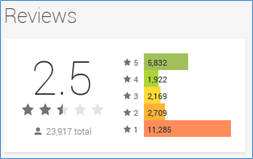
Doing a quick drive by on my previous blog post on Facebook Home™, heralded as the harbinger of vanguard of ‘apperating systems’ – never mind that there is likely nothing comparable from a major player (for example, Amazon is not apperating anything, it now has an OS team working on a fork of Android). Leaving aside the nonsensical ink spilled on this (Google should be worried, etc.). Like everything in the technology world, success of failure all depends on strategy. What will you do different from everyone else?

For example, what is the raison d’etre for Facebook home? One would assume it is to increase the share of people’s time spent in the Facebook UX even as eyeballs migrate more to mobile phones (smart phones). To do this well in the way that FB Home is constituted, one has to either meet or raise the bar of the OS – widgets, notifications, app launcher, etc. One could imagine a host of APIs that make this possible from FB home, although it would be a lot more work and expense to make it so. Talk less of evangelizing those APIs. Or be less intrusive all together (which might adversely affect the minutes spent). But minutes spent it not the only goal. Facebook is now a public company and needs to make money. How does it translate stickiness (if it succeeds) into money? Obvi there is no answer today for FB Home. But you would imagine that an answer has to come at some point. Ad integrated FB Home? Commercial/Brand feeds on FB home (an opt-in system?). The options are varied.
In short, for FB Home and other apperating systems to be viable, they have to (a) ironically, begin to mimic the OS, a la Flash™ or Adobe Air™. This is another way to say that the OS does a lot of valuable stuff, otherwise OS companies will not invest in them. To ‘replace’ them to a significant extent, one has to clone some of the best bits of them; and that’s not cheap. In fact after a while, what you create starts to look like an OS or a runtime. Amazon understands this and have gone a very different direction with its own investments, fully forking Android and making its own hardware; a path that many assume FB would take (a logical path except that FB might not have compelling content to make this interesting to a large market and differentiated hardware is very hard to do). (b) They have to find a way to be connect to the commercial strategy of the creator directly or indirectly.
FB Home does not do any of these things well yet. It has to evolve in this direction or it will likely stay pretty irrelevant.
